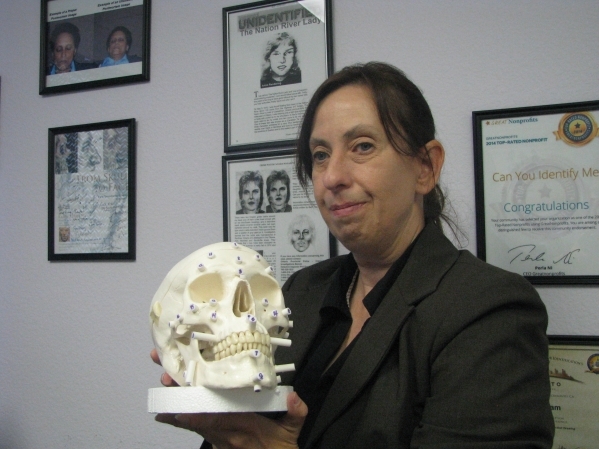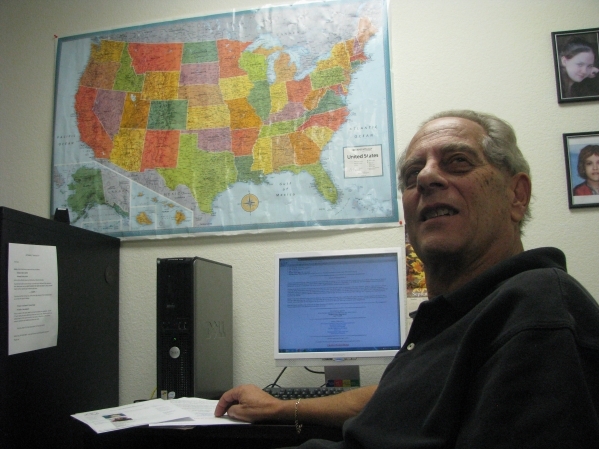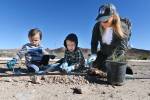Nonprofit aims to identify missing people, bodies
Watching police procedurals on television might give you the impression that every time the authorities find a body, it is identified in days, if not minutes. Rebel Morris, founder and executive director of Can You Identify Me?, said that is not the case.
"Every year, there are 80,000 individuals in the United States that remain missing," Morris said. "There are 40,000 bodies who remain unidentified."
The nonprofit was founded in 2011 with the hopes of connecting unidentified bodies with missing persons. Until May of this year, it was based out of Morris' east valley home, but a fundraising push helped her get a small office at 405 Max Court, Suite 240, in an industrial area of Henderson, a block off of Boulder Highway.
The nonprofit doesn't have a quantifiable success rate because Morris said she and her volunteers don't look on themselves as the ones who solve the case. They try to facilitate bringing information together from a wide range of resources so that local law enforcement departments can solve cases. Morris feels like they are making a difference, which is one of the reasons the retired paralegal puts in 50 to 60 hours working on Can You Identify Me?.
"It's not just me," Morris said. "We have volunteers who come here and put 10 or 20 hours a week and some that put in 30 to 40 hours per week. These are students, former law enforcement officials, other retirees; we have people from a lot of different backgrounds volunteering."
In some cases, they are working with family members who have been trying for 30 years to find out what happened to their loved one; in other cases, it's someone who has been missing for only three days.
"You would think that with today's technology, it shouldn't be that hard," Morris said. "Someone gets found; someone goes missing. You match the DNA, and that's done. But if you haven't been in the military or haven't been arrested for a hard crime or volunteered your DNA, it's probably not on record."
Despite resources such as the Combined DNA Index System (CODIS), the Automated Fingerprint Identification System (AFIS), and the National Crime Information Center — a computerized database of documented criminal justice information available to virtually every law enforcement agency nationwide, 24 hours a day, 365 days a year — people fall between the cracks. Morris said it's often the human element that unintentionally impedes the system.
"We've found that a lot of local government tends to not like the federal government," Morris said. "A lot of small town law enforcement organizations are underfunded or don't have great resources. Sometimes they might not have some of the most competent staff, and often, they are allocating their resources towards current cases. We try to help and be a go-between or extra eyes looking at a problem."
The volunteers handle a number of tasks, such as cold-calling coroners to see if they have any outstanding cases they could use a hand with. They have resources who will conduct DNA sequencing for free and experience connecting multiple databases to find possible matches. They also work with forensic artists who volunteer their time to reconstruct a damaged or skeletal face to create an image of what the individual probably looked like when alive.
"Jane Billingham, our forensic art program manager, will be here at the end of November," Morris said. "She's based out of the United Kingdom. Our FA team now has about eight artists around the world."
One volunteer with a lot of practical background for the task is Stu Michaels, who worked in security at several casinos in town after 20 years as a New York Police Department detective. Between calls, he explained the sort of work he does for Can You Identify Me?
"I try to make matches," Michaels said. "Right now, I'm working on one from 1969, a 4-year-old child who disappeared. I just got off the phone with the Baltimore Police, and they were very positive about this. They were saying 'Let's do this.' They're looking into it on their end, and I'm hoping to hear back from them soon."
Special training such as Michaels' isn't necessary to volunteer at the nonprofit, and Morris is seeking volunteers from all walks of life. She can always find a way for someone to help if they're willing to give the organization some of their time.
Visit canyouidentifyme.org or call 702-866-9755.
— To reach East Valley View reporter F. Andrew Taylor email ataylor@viewnews.com or call 702-380-4532.





























